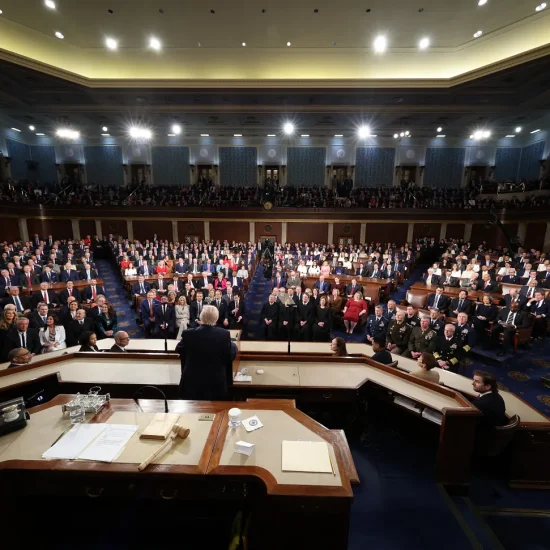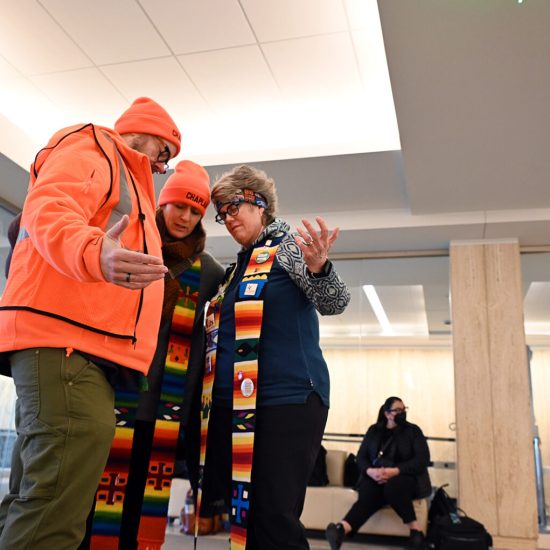
NOTE: This piece was originally published at our Substack newsletter A Public Witness.
Each year, empty spaces in malls and shopping centers across the country suddenly fill up with costumes and toys as Spirit Halloween moves in. The chain of pop-up stores briefly employs about 50,000 workers in more than 1,500 temporary stores and brings in about $2 billion each year. By next week, the stores that are currently full of scary and whimsical outfits and lawn decorations will be empty. Well, except for those rebranded as Spirit Christmas.
As an experiment, the company opened 10 Spirit Christmas stores last year to sell festive decorations, apparel, and gifts — and they’re tripling that number this year. While Spirit Halloween does seem to capture the, well, spirit of that holiday, I’m not sure Spirit Christmas does. I mean, it does fit the consumeristic, sappy version that dominates our society. But it misses the mark of what the time leading up to Christmas should be focused on. Unfortunately, even a lot of what is produced in church life seems off as well.
That’s why we launched our Unsettling Advent devotional series in 2021. And it returns in one month for the fifth round of daily emails reflecting on current issues plaguing our world that connect with the realities of when Jesus arrived that first Christmas.
Each year, more than 20 writers craft reflections considering both our current world and the old Christmas stories. We’ve covered issues not usually found in Advent devotionals, but they’ve helped us and readers think more fully about Jesus’s birth and what it means to follow Jesus today. During the first four years, we covered:
- 2021: Advent in a time of death/COVID, racial injustices, and insurrection
- 2022: Advent in a time of war (in Ukraine), refugees, and (gun) violence
- 2023: Advent in a time of state executions, political anxieties, and bloodshed in Israel
- 2024: Advent in a time of rulers clinging to power, dangerous pregnancies, and violence in Lebanon
The devotionals have won multiple awards from the Associated Church Press and Religion Communicators Council. And they led to a Lenten devotional book in 2023. We also hear from many readers each year who want to make sure we create another round.

A police officer guards a cordoned-off area near a Christmas Market in Magdeburg, Germany, on Dec. 20, 2024. (Ebrahim Noroozi/Associated Press)
So with a Bible in one hand and a newspaper in the other, we’re excited to announce this year’s themes for Unsettling Advent, which will start on Nov. 30 and run through Christmas Eve:
- Advent in a time of religious nationalism
- Advent in a time of starvation
- Advent in a time of soldiers in the streets
Once again, more than 20 writers will help us consider Advent in light of news from this year. While we’ve felt like the last few years have been unsettling, this year has been even more so. But rather than escapism, what if the Advent season can meet us where we are today?
Advent in a time of religious nationalism. When Jesus went to the Temple to worship and teach (or flip tables), he did so in the building rebuilt by King Herod. Yes, the same guy who tried to kill baby Jesus. Religion scholar Bruce Chilton noted in The Herods: Murder, Politics, and the Art of Succession that “Herod’s work on the Temple enhanced his standing as a Judean king,” positioning him “as patron of Judaic sacrifice as well as the agent of Roman might.” By making the Temple great again, Herod won support from many religious leaders, which in turn helped him hold onto political power during a tumultuous time in the region. Herod also looked for other ways to bestow religious legitimacy on his reign and bring religion and the state together to protect his own power. Like by marrying a daughter of the high priest and breaking tradition to pick a new high priest (thus creating a new model of state control over the Temple’s leadership).
Today, authoritarian leaders and those who would like such power also seek to control religion. Such religious nationalism can be seen in various faiths, including the rise of Hindu nationalism in India and Islamic nationalism in Turkey. In the U.S., this potent mix is known as Christian Nationalism. Though the dangers have also been clear for years, it’s particularly obvious as we live in the year of Project 2025. But just because someone claims to be making Christianity great again doesn’t mean they aren’t trying to kill the message of Jesus. Too many faith leaders today would rather hang out in Herod’s court than trek with the Magi to worship the newborn Messiah.
Advent in a time of starvation. Biblical scholar Carol B. Wilson argued in For I Was Hungry and You Gave Me Food: Pragmatics of Food Access in the Gospel of Matthew that in the eastern part of the Roman Empire at the time of Jesus and his disciples, “25% of the population lived below subsistence level” and another 30% were always “at risk of slipping below” that level. Concerns with such “endemic food shortages, punctuated by episodic extreme food shortages” can be found in biblical writings addressing “who has the power and desire to provide sufficient food for the people,” the emperor or God? All of this matters, Wilson added, because “access to food is always about power: about who controls the production, distribution, and the laws and customs validating the system of privilege.”
On that last front, things haven’t changed in 2,000 years. Access to food is still about power. And those in power now are making things worse. Eugene Cho of Bread for the World estimates that cuts to USAID by Donald Trump and Elon Musk have already caused about 400,000 deaths globally. And that number could rise to 14 million by 2030 (of whom more than 4.5 million will be children under the age of five). The wealthiest man in the world helped an administration of another wealthy man doom millions to die of starvation and other preventable diseases. Meanwhile, nearly 42 million people in the U.S. could lose food aid on Saturday amid the government shutdown. That includes 20 million children. Church and community food pantries won’t be able to cover the gap. And even though the government is allowed to use contingency funds to continue providing such food aid during a shutdown, the Trump administration is saying it will not do so, choosing hunger for tens of millions of people.
Advent in a time of soldiers in the streets. Long before Roman soldiers beat and crucified Jesus, he would’ve been used to their presence. All in his community were terrorized and traumatized by the Roman forces. Here’s how biblical scholars Marcus Borg and John Dominic Crossan put it in The First Christmas: “The major event in his village’s life was the day the Romans came. As he grew up toward Luke’s coming-of-age at twelve, he could not not have heard, again and again and again, about the day of the Romans — who had escaped and who had not, who had lived and who had died. The Romans were not some distant mythological beings; they were soldiers who had devastated Nazareth’s backyard around the time of his birth.” For the oppressed Jewish people, Roman soldiers were a constant and seemingly omnipresent threat.
This year has brought dramatic scenes of militarized immigration officers and even uniformed military personnel patrolling U.S. streets. Peaceful protesters have been beaten and teargassed, clergy have been shot with pepper balls, and journalists have been arrested for trying to cover it all. Church worship services have been impacted and many people are hiding in fear of being snatched. Communities like Los Angeles, Portland, Chicago, Memphis, and Washington, D.C., have particularly faced this scene of soldiers in the streets. Meanwhile, the administration is even misusing Bible verses to justify their imperial violence.
We invite you to journey through Advent with writers who will prepare your heart and spirit for the miracle of Christmas. Instead of distracting you from the world, they will encourage you to live more faithfully within it. In these unsettling times, our devotions will unsettle the commercialistic, sappy takes on this season that skirt past the hard places where God is still with us.
You can sign up for the free daily devotionals — which will land in your inbox beginning on Sunday, Nov. 30 — by visiting advent.wordandway.org and entering your email address. (If you signed up previously, you should still be on the list.) We don’t promise the daily devotions will be cheery, but we are sure they will challenge and inspire you during this holy season.
As a public witness,
Brian Kaylor
A Public Witness is a reader-supported publication of Word&Way. To receive new posts and support our journalism ministry, subscribe today.






